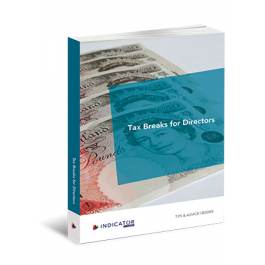Tax Breaks for Directors
A Tips & Advice book about...
In a nutshell
This book is a must-read for all directors who want to pay less tax in a legally safe way. It explains how you can take full advantage of the available tax breaks, so you can make the right choice for your situation. This new edition includes all the latest changes to the tax and NI rules, some of which are targeted directly at directors, so it's more important than ever to have the latest information to hand.
In detail
Regularly reviewing your remuneration package for tax efficiency should be high on your "to do" list as a director. This book brings all the tax breaks within easy reach, giving you a clear overview of the various reliefs and exemptions you can safely benefit from, including:
- Salary and benefits v dividends
- Employer-supported childcare
- The employment expenses exemption
- Salary sacrifice arrangements
- Using your home for business
- Income shifting to your spouse
- Company cars
- Loans
- Saving for your retirement
- Selling your company
Written in plain English, this book enables you to develop a tax-reducing strategy that best suits your personal situation. Simple, safe, secure.
We've created this Tips & Advice book especially for...
Company directors/shareholders that want to:
- Develop a tax-efficient remuneration strategy
- Get a clear view on the various tax breaks available
Financial advisors and accountants that want to:
- Help clients choose the most appropriate tax-saving strategy for their situation
In this Tips & Advice Book you'll read about...
Part 1 - Avoiding tax on rental income
1. Rental income - the tax basics
1.1. Income tax rates
1.2. How do I work out rental profits (or losses)?
1.3. Which tax returns must I complete if I have rental income?
1.4. Rent-a-room relief
2. Reduce your rental income by maximising expenses
2.1. What costs can I deduct from my rental income?
2.2. Interest charges from 6 April 2017
2.3. Structural repairs and maintenance costs
2.4. Renewing fixtures and fittings
2.5. Renewing furnishings and equipment
2.6. Capital allowances
2.7. Travelling costs
2.8. Pre-letting expenses
2.9. Legal and professional costs
2.10. Costs of services provided, including wages
2.11. Other expenses
3. Making the most of your rental losses
3.1. What is a rental loss?
3.2. Furnished holiday lettings
Part 2 - Saving tax on property disposals
4. Capital gains - the tax basics
4.1. What is capital gains tax?
4.2. Reduce the gain by claiming all allowable costs
4.3. CGT-avoidance strategy - don’t sell, just re-mortgage
4.4. Allowable losses
4.5. CGT-avoidance strategy - offset stock market losses against the property gain
5. Avoid CGT by using private residence relief
5.1. Private residence relief (PRR)
5.2. Private letting relief
5.3. CGT-avoidance strategy: live and let not buy to let
5.4. CGT-avoidance strategy: let and live
5.5. CGT-avoidance strategy: nominate/flip a residence
5.6. Selling land that is part of my main residence
5.7. Making use of children’s tax allowances
6. The tax implications of gifting properties
6.1. Avoiding CGT when transferring property to someone other than my spouse
6.2. How to avoid CGT on gifts of holiday homes
6.3. Using trusts to avoid CGT
6.4. Tax-avoidance strategy - using trusts to defer CGT on residential property gifts
6.5. Inheritance tax on lifetime gifts
6.6. IHT (and CGT) avoidance strategy: equity release
6.7. Tax-avoidance strategy: transfers to spouse
6.8. The main residence nil rate band
Part 3 - Buying strategies to avoid tax
7. Buying a property in joint names
7.1. Joint ownership with a spouse
7.2. How do I transfer part of a property to my spouse?
7.3. Joint ownership with someone other than my spouse
8. Owning properties through a limited company
8.1. What is a limited company?
8.2. How is rental income taxed in a limited company?
8.3. How are capital gains taxed in a limited company?
8.4. How do I take money out of a limited company?
8.5. Advantages of using a limited company
8.6. Disadvantages of using a limited company
8.7. So should I buy a residential property through a limited company?
8.8. Using a property management company
9. Investing in commercial property
9.1. Why should I invest in commercial property?
9.2. Can I take advantage of business asset disposal relief?
9.3. Should my company’s premises be owned by me or the company?
9.4. Tax-avoidance strategy: use a pension scheme to buy a commercial property
9.5. Capital allowances
10. Other tax considerations when buying an investment property
10.1. Should I take out an interest-only or a repayment mortgage?
10.2. Stamp duty land tax (SDLT)
10.3. SDLT on leases
Part 4 - Overseas property tax issues
11. Moving overseas
11.1. Can I avoid tax by moving overseas?
11.2. Can I also avoid income tax if I’m non-resident?
12. Investing in overseas property
12.1. Why invest in overseas property?
12.2. How is overseas rental income taxed?
12.3. How are capital gains on overseas properties taxed?
12.4. What are the inheritance tax implications of owning overseas property?
12.5. Should I set up a limited company to invest in overseas property?
12.6. Are there any other taxes that I need to consider?
Special subscribers' offer
£100.00
£80.00
Only if you already have a subscriptionStandard offer
£100.00

Got a question? Call Customer Services
(01233) 653500


 (01233) 653500
(01233) 653500 







